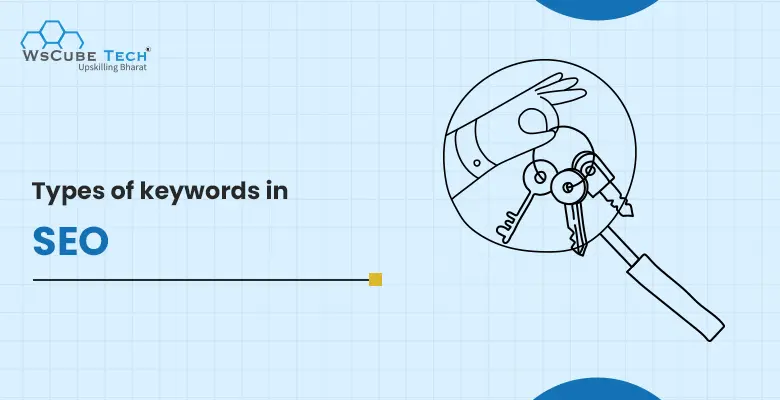There was a time when you could easily rank on the first page of Google with keyword stuffing and by hitting a certain keyword density. But, now things changed.
Search engines have become smarter and better at understanding search queries. They have moved from a search-first to a people-first approach, which has changed how keywords are used for SEO in content.
Keywords are important in SEO and play a vital role in helping search engines understand:
- What is your content about
- How systematically it covers a topic and matches the intent of searchers
- Which search queries should your content rank for
So, the more you know about the types of keywords in SEO and how they are used, the brawny you can make your SEO strategy.

What are SEO Keywords?
SEO Keywords are the phrases or words users use to search for products, services, or information online. Further, they are the words or phrases search engines use to rank and sort content. You optimize your web content around SEO keywords so you can get found and drive traffic to your website—hopefully, in turn, driving conversions and sales for your business.
For example, if you want to buy new shoes, you might type something like “men’s casual shoes” into Google. Even though that phrase consists of more than one word, it’s still a keyword.
When you select and use SEO keywords, the objective is to ensure that your keywords align with what your potential consumers would be searching for, i.e., search queries and how search engines understand and categorize your website.
In the above case, the search engine defines the top result. It quickly suggests similar questions and content deemed most valuable and relevant to answer the search query.
If “men’s casual shoes” is something your prospective users would search for and is relevant to your service offerings, you will benefit from extra exposure and website traffic when you appear higher in search results for this phrase, which might be one of your SEO keywords.
Upskill Yourself With Live Training (Book Free Class)
Also Read: Top 8 Benefits of SEO Marketing in 2024 (Importance)
Why are Keywords Important in SEO?
SEO keywords are important because they help you reach your target customers when searching for information about your business online. Choosing and using the right keywords is essential for any SEO strategy. The SEO keywords you pick up to target must align with your SEO strategy and your overall business goals.
Ranking higher in the SERPs (Search Engine Result Page) can drive more targeted traffic to your website. This is why finding keywords people search for is the first step of any SEO campaign.
SEO is only possible with keywords. But when you have a list of the appropriate keywords, you can start working on crucial SEO tasks like:
- Figuring out your site architecture
- Optimizing landing and sales pages
- Writing content for YouTube videos and blog posts
- Planning out product and category pages
What is the Role of Keywords in SEO?
In the SEO world, keywords are often called the heart of SEO.
The reasons are:
- Increased Relevance: Keywords ensure your content is relevant and easily accessible to your target audience. You tell search engines what your content is about by integrating relevant keywords into your content.
- Higher Rankings: Optimal keyword usage notably improves your website’s ranking on SERPs. The higher your content ranks, the greater visibility and traffic it gets.
- Better User Experience: With the right keywords, you provide your audience with a smooth and hassle-free experience so they can easily find what they want on your website.
Types of Keywords in SEO
Let’s understand the different types of keywords in SEO with examples:
Types of SEO Keywords: User’s Search Intent
1. Informational Keywords
Often, customers use informational keywords in the research phase to seek more information about a particular topic. These keywords typically start with the ‘”5Ws and 1H'”: who, what, when, where, why, and how. Optimizing content with informational keywords help drive organic traffic to your website as potential customers use them to research products or services they may be interested in buying.
Users using informational keywords seek informative, insightful content that answers questions or solves problems.
For example, if a user types “how to prepare ghee at home” into a search engine, they use an informational keyword. Your website might provide a detailed step-by-step guide on preparing ghee and meeting the user’s information needs.
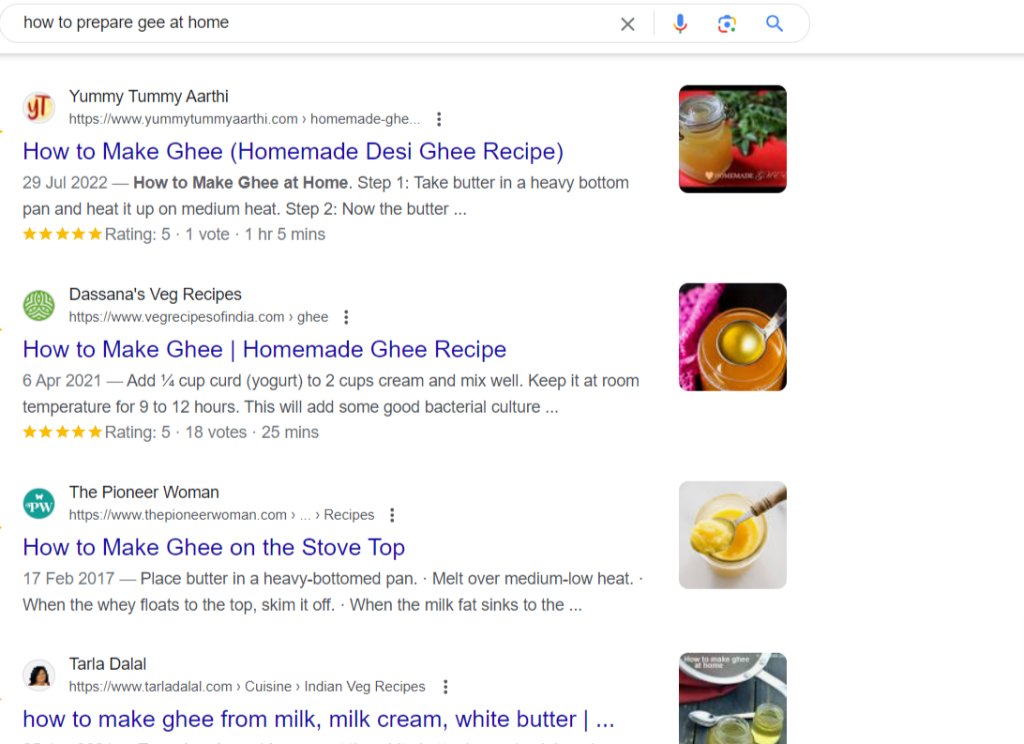
With a consistent use of relevant informational keywords, you can draw in more of your target audience, answering their queries and boosting your SEO ranking.
2. Commercial Keywords
Commercial keywords refer to advertising-related searches, such as discount codes and promotional offers businesses set up online to attract more buyers over time. These terms bring people directly into contact with your company and offer valuable insights about customer preferences, which you can use when planning campaigns for future marketing efforts. These keywords usually include ‘buy,’ ‘price,’ ‘best,’ ‘review,’ and ‘comparison.’
For example, suppose a user enters the search term “Best mobile phone under ₹10000“. This commercial keyword indicates that the user is likely to purchase and is comparing their options.
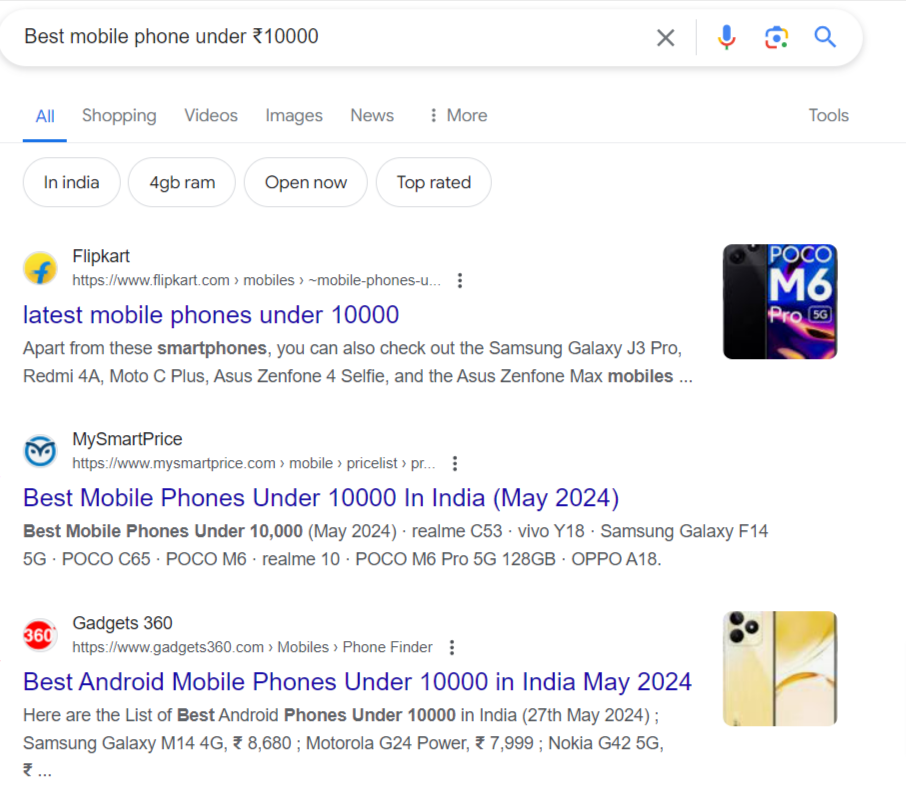
By optimizing your site with these keywords, you can direct highly targeted, ready-to-buy users to your website.
Also Read: Top 7 Free Backlink Checker Tools in 2024 (Check Backlinks)
3. Transactional Keywords
Users use transactional keywords when they are in the conversion phase of the purchase funnel. They already know what they want and use particular buying keywords to help them find the right place to purchase. Customers ready to buy often use transactional keywords, including terms like ‘purchase,’ ‘order,’ ‘buy now,’ and ‘discount codes.’
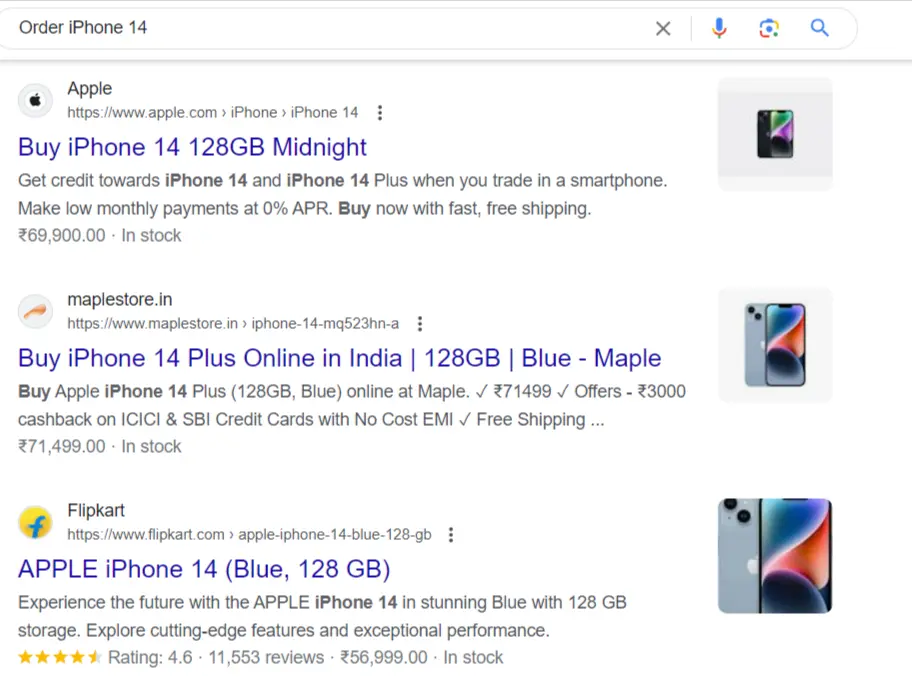
For example, users who search “Order iPhone 14” in a search engine are likely primed and ready to buy. By integrating relevant transactional keywords, you can capture these ready-to-convert visitors and guide them to your site.
4. Navigational Keywords
Users use navigational keywords while looking for a particular website, product, brand, or service online. This type of query implies an intention to take action—usually visiting the website directly—so it allows marketers more opportunities for conversions if their page appears at the top of SERPs for such terms. These keywords often include brand names, product names, or the names of specific services.
For example, a user searches for “Nike Running Shoes for Men”. If you have effectively optimized your site for this navigational keyword, the user should find your website at the top of the search results.
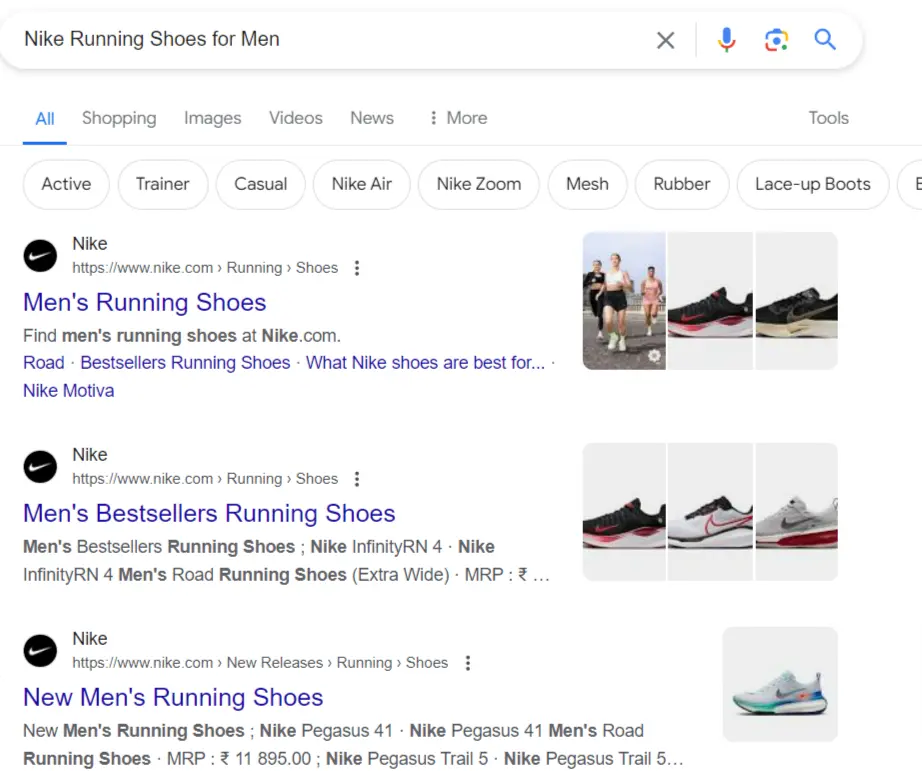
By understanding and utilizing these navigational keywords, you can ensure that your website is found effortlessly by users explicitly searching for it.
How to Find User’s Search Intent Keywords?
Tools like Answer the Public and Answer Socrates generate questions such as what, who, why, when, where, and how. Thus, they are especially good for brainstorming informational keywords.
Even if you use a tool that doesn’t have a specific feature for filtering keywords by intent, don’t worry. You can still use modifiers like the ones we discussed for each intent to generate similar keyword options. This shows your resourcefulness and adaptability in the face of SEO challenges.
Types of SEO Keywords: Length
1. Seed Keywords
Seed keywords, often called primary or main, are the fundamental terms associated with your brand or industry. These keywords contain one or two words representing your business’s core offerings.
For example, if you sell leather jackets in the e-commerce industry, your seed keywords might be as straightforward as “men’s leather jackets” or “women’s leather jackets.”
Seed keyword research is the first step in finding mid-tail or long-tail keywords for a business.
2. Short Tail Keywords
Short-tail keywords are broad search phrases containing one to three words. They are less specific but have a higher search volume, making them more competitive to rank for in search engines.
In the early stages of their buying journey, users use short-tail keywords to look for more general information. For example, a user might search for “Digital cameras.”
But how can you competently incorporate short-tail keywords into your SEO strategy, especially considering the fierce competition for these terms?
Given their high search volume, ranking for these keywords can significantly boost your visibility and attract a larger audience.
3. Long Tail Keywords
Long-tail keywords are distinct search phrases that are often longer than other keywords. Users use them when they know exactly what they are looking for or are closer to the point of purchase.
Due to their specificity, long-tail keywords are less competitive, making them a valuable tool for SEO, mainly for smaller businesses or those just starting their SEO journey.
For example, a user searches for a “Waterproof digital camera for underwater photography. “This long-tail keyword is particular, indicating the user knows exactly what they are after.
A business selling underwater photography equipment could thus greatly benefit from incorporating such long-tail keywords into its SEO strategy.
But how can you identify the right long-tail keywords for your brand?
Long tail keywords with less SEO difficulty and the correct volume count for your target country are the best keywords to optimize your content accordingly.
How to Find Types of Keywords by Length?
The most common way to find keywords of different lengths is to use the autocomplete feature on a search engine like Google. As you type, you will see various completions of your query—long and short.
The Related Searches and People Also Ask sections in search results are helpful, too. However, keyword research tools are the best way to find keywords that are the length you need. Most can be filtered by a maximum or minimum number of words. Additionally, there are SEO tools, especially for finding long-tail, low-competition keywords.
Interview Questions for You to Prepare for Jobs
| Digital Marketing Interview Questions | SEO Interview Questions |
| Email Marketing Interview Questions | Content Writing Interview Questions |
Types of SEO Keywords: Match
1. Exact Match Keywords
These search phrases match the correct term or are a close variation of that precise term. They enable you to target your audience precisely, resulting in higher relevancy and ad ranking, which lead to better conversion rates.
For example, if you are selling wooden furniture, an exact match keyword could be “solid oak center table.”
This keyword targets users who are explicitly looking for a solid oak center table, reflecting their exact search intent.
2. Broad Match Keywords
These keywords encompass any user searches that are variations or expansions of your keyword. They could include synonyms, singular or plural forms, misspellings, or variants.
Broad-match keywords are a great way to reach a wide audience, but their broad nature can also lead to irrelevant traffic.
For example, if you are a retailer selling baking utensils, a broad-match keyword could be “baking tools. “While this keyword might bring in users searching for anything from baking pans to measuring spoons, it could also attract users looking for baking classes or recipes.
Also Read: What is Technical SEO? Beginners Guide in 2024
3. Phrase Match Keywords
These keywords are a type of keyword match that enables your ad to show when a user searches for the exact keyword or exact keyword with additional words before or after it.
They balance reach and precision, enabling you to target a wider audience than exact-match keywords without attracting irrelevant traffic like broad-match keywords.
For instance, if you are selling organic skincare products, a phrase match keyword could be “organic skincare products. “This keyword might also cover search queries like “best organic skincare products” or “organic skincare products for dry skin. “This strategy ensures you capture a broader audience while maintaining relevancy to your offerings.
4. Negative Keywords
These are the words you do not want to be associated with your website. Negative keywords are helpful as they help you avoid competition from websites using the same keyword and phrase combinations.
For example, a commonly used negative keyword in Google Ads is the word free- if you are paying for ads, you don’t want to be using ad spend on searches for free products or services.
How to Find Types of Keywords by Match?
The match keywords are usually denoted by enclosing them in square brackets, like this: [keyword]. For example, if an advertiser targets the match keyword [white shoes], their ad will only be shown to users searching for the exact phrase “white shoes.”

Types of SEO Keywords: Role-Oriented
1. Primary Keywords
Also known as focus keywords, these are the main keywords that your content is built around. You want to rank for these terms to drive the most relevant traffic to your site.
Primary keywords must directly relate to your business and products or services. These keywords should be used in the title tags, headers, meta descriptions, and content.
For instance, if you are a company specializing in custom-made furniture, a potential primary keyword could be “custom-made wooden sofa.” This term accurately describes your key offering and is one your potential customers will likely search for.
2. Secondary Keywords
Secondary keywords support your primary keywords by providing additional context or detail. They are often topically related to the main keywords, helping search engines understand the breadth and depth of your content.
Incorporating secondary keywords into your content improves your website’s visibility in search results, driving more targeted traffic.
For example, if your primary keyword is “custom-made wooden sofa,” potential secondary keywords may include “handcrafted sofa,” “hardwood sofa,” and “custom living room furniture.”
3. Competitor’s Keywords
Competitor keywords are phrases your business competitors rank for in search engine results. By identifying and analyzing these keywords, you can gain insights into your competitors’ strategies for drawing traffic and apply similar tactics to your SEO strategy.
Understanding your competitor’s keywords can help you identify gaps in your strategy and target keywords you may have overlooked. But how do you find out which keywords your competitors are ranking for?
How can you leverage this information to your advantage?
For example, if you are running a customized furniture business and one of your competitors is “Classic Furniture Store,” you would use SEO tools to investigate the keywords for which Classic Furniture Store ranks.
With this knowledge, you could start creating content around this keyword, helping you compete more effectively with your competitor on the search engine results page.
How to Find Types of Keywords by Role-oriented?
There are many ways to find role-oriented keywords. For instance, begin your research with a tool like Google Trends to:
- Check if there’s interest in a topic you are considering
- Determine if that interest is consistent, waning, or upsurging
- Compare interest in two or more potential keywords
Once you have found one with a decent amount of interest, check it in your preferred keyword tool. Check if the keyword has:
- You could outrank on the first page if the keyword is highly difficult and the SERP has few to no sites. Look for a less competitive alternative keyword.
- A medium to low keyword difficulty score and the SERP have some sites you could outrank on page one, so it may be a good focus keyword. Use available filters to search more specific semantic and secondary keywords.
Also Read: 20+ Key SEO Skills You Need to Succeed in 2024
Types of SEO Keywords: Target-Oriented
1. Branded Keywords
These are search terms that comprise your brand name or unique product name. They are essential to SEO strategy, particularly for building brand awareness and reputation.
Users searching with these keywords often have a higher intent, as they already know your brand or product. But how can you leverage these branded keywords effectively?
For example, consider a business like Apple. Their branded keywords might include terms such as “Apple iPhone 15” or “MacBook Pro.” People searching using these terms already know Apple as a brand and seek specific products.
The key to maximizing the potential of branded keywords is to ensure that your website and content consistently and accurately reflect your brand name and product offerings. Branded keywords are a direct reflection of your brand in the eyes of your potential customers, so it is pivotal that they are used effectively.
2. Generic Keywords
Generic keywords are broad search terms that do not include brand-specific information. They often relate to your industry or products but aren’t tied to your brand. Due to their broad nature, generic keywords are highly competitive, encompassing a wide range of products or services within a given industry.
So, given their competitive milieu, how can generic keywords be effectively used? For instance, consider a term like “smartphone”. It’s not brand-specific, but it’s still highly relevant to businesses in the mobile phone industry. However, due to its broad appeal, the competition for such a term would be high.
3. Product Specific Keywords
Product keywords refer to search phrases directly related to your business’s product or service. They are much more specific than generic keywords and often include detailed information, such as the model, color, size, or other product features. These keywords are used by users who know what they want and are often on the verge of purchasing.
Since they are so specific, they are less competitive and more accessible to rank for, making them a valuable asset in your SEO arsenal. But how do you identify the right product keywords for your business?
For example, suppose you run an online electronics store. In that case, your product-specific keywords might include phrases like “Samsung Galaxy S21 Ultra in Phantom Black” or “Apple AirPods Pro with Wireless Charging Case.”
Users searching with such detailed keywords are likely ready to make a purchase, and with the right strategy, you can level up your sales by targeting long-tail keywords like these.
4. Market Specific Keywords
Market-specific keywords are highly relevant to your specific market or industry. They are narrower than generic keywords and target a particular niche within your broader sector or market.
These keywords are useful in reaching your target audience. But how do you find market-specific keywords to drive the right traffic to your site?
Market-specific keywords for this business might include “bamboo cutting board,” “organic cotton bedding,” or “ecycled glass drinkware.” By targeting these terms, the retailer attracts consumers interested in eco-friendly home products, increasing the likelihood of conversions and sales.
5. Review Keywords
Review keywords are search terms that include words or phrases indicating a user’s intent to find reviews or feedback for a product or service. They are crucial to your SEO strategy as they can lead potential customers to your website at a critical point in their decision-making process.
But how do you leverage these review keywords to drive more traffic to your site? Users searching with review keywords are about to purchase, and positive reviews tip the balance in your favor.
For example, consider a review keyword like “MacBook Pro reviews.” Users employing such a search term are potentially close to purchasing a MacBook Pro but seek reviews to validate their decision.
By optimizing your website and content for such review keywords, you can attract these high-intent users and possibly convert them into customers.
6. Customer Centric Keywords
These keywords are search terms directly related to your customer’s experiences, needs, and goals. They often include phrases or questions your customers frequently ask, reflecting their thoughts and concerns.
Using customer-centric keywords, you can bridge the gap between your business and the customers, offering solutions that align with their needs and expectations. But how can you uncover these valuable customer-centric keywords?
For example, if you are an equipment retailer, your customer-centric keywords could be queries like “best home gym equipment for beginners” or “how to maintain a treadmill at home.” These keywords reflect your customers’ questions.
By targeting these keywords, you can enhance your SEO ranking and provide valuable content that addresses your customers’ customers, building trust and fostering customer loyalty.
How to Find Target-oriented Keywords?
No matter the research tool you use or the type of keyword you are looking for, the procedure is the same. Type a keyword that reflects the topic and the location, market, customer, or brand you are interested in keywords for. For example, you typed a market-specific keyword web design. Then, use one of the filters to see customer-defining keywords (web design-related keywords for beginners). Use a similar process for any targeted SEO keyword type you are looking for.

LSI Keywords: Semantic Keywords
LSI (Latent Semantic Indexing) Keywords are SEO terms that help search engines better understand your website’s content. These keywords provide context, allowing search engines to comprehend a page’s subject matter.
For example, suppose your primary keyword is “weight loss diet.” LSI keyword terms might be “healthy weight loss diet plans,” “weight loss recipes,” “calorie intake for weight loss,” and “best foods for weight loss.”
Incorporating these keywords in your content enhances your SEO strategies and provides your audience with a more comprehensive and relevant information source.
How to Find Semantic Keywords?
One of the easiest ways to find the LSI keywords is through the search engine. Type a phrase in Google Search to find the relevant LSI keywords and search terms. For instance, if you google the search term Website, you will find the LSI keywords featured in the autocomplete drop-down menu.
Free Courses for You
| Course Name | Course Name |
| Google Tag Manager Course | Affiliate Marketing Course |
| Semrush Course | Video Editing Course |
| Blogging Course | Email Marketing Course |
| Shopify Course | Photoshop Course |
FAQS on Types of Keywords in SEO
There are 9 keywords: short-tail, long-tail, short-term, long-term, product-defining, customer-defining, geo-targeting, and intent targeting. These keywords have unique strengths that multiply your SEO efforts in different situations.
Short tail keywords, focus or head keywords, consist of 1 or 2 words with high search volume. They have broad meanings and high competition, making it challenging to determine user intent. For instance, typing SEO yields varied results due to its ambiguity.
Long-tail keywords are phrases containing 3 or more words. While they may have lower search volumes than short-tail keywords, they offer specificity. Examples include ‘best free SEO tools’ or ‘on-page SEO techniques,’ which, due to their specificity, aid in better page ranking and higher conversion rates.
Keywords can reveal buyer intent, categorized into 4 types:
–Informational: Users seeking awareness about a product/service often begin with ‘how,’ ‘what,’ or ‘is it.’
–Navigational: Searches aiming for a specific product in a known store, seeking more information.
–Commercial: Queries centered around price and feature comparisons after being aware of the brand.
–Transactional: Keywords used by ready-to-buy prospects after comparing and being content with information and price.
Keywords in specific industries serve distinct purposes:
–Market Segment: Broad keywords indicating the industry’s offerings, like ‘clothes’ for a clothing brand.
–Customer-Defining: Phrases targeting a specific audience, such as ‘clothes for men’ or ‘clothes for teens.’
–Product: Keywords including brand names that generate high conversion rates within brand-loyal niches.
–Geo-Targeted: Location-based keywords benefit local businesses and cater to users looking for local information, like ‘Where can I buy [product] in [location]?’
Conclusion
SEO Keywords are the linchpin between prospective customers’ searches and the content you provide to meet those needs. They are vital to any business or website connecting over the World Wide Web. Thus, understanding the type of SEO keywords and how they powerfully place your page on the top of a search list becomes vital as algorithms evolve.
Read more blogs:



